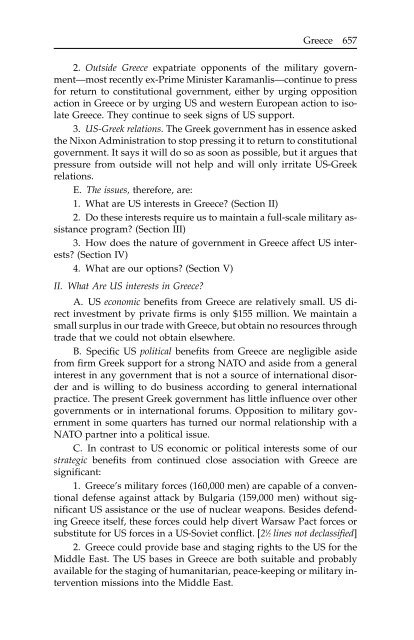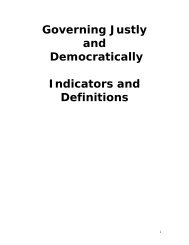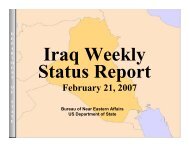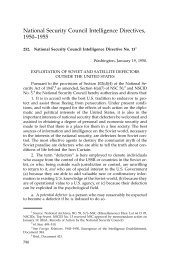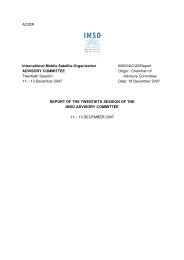Greece - US Department of State
Greece - US Department of State
Greece - US Department of State
You also want an ePaper? Increase the reach of your titles
YUMPU automatically turns print PDFs into web optimized ePapers that Google loves.
<strong>Greece</strong> 657<br />
2. Outside <strong>Greece</strong> expatriate opponents <strong>of</strong> the military government—most<br />
recently ex-Prime Minister Karamanlis—continue to press<br />
for return to constitutional government, either by urging opposition<br />
action in <strong>Greece</strong> or by urging <strong>US</strong> and western European action to isolate<br />
<strong>Greece</strong>. They continue to seek signs <strong>of</strong> <strong>US</strong> support.<br />
3. <strong>US</strong>-Greek relations. The Greek government has in essence asked<br />
the Nixon Administration to stop pressing it to return to constitutional<br />
government. It says it will do so as soon as possible, but it argues that<br />
pressure from outside will not help and will only irritate <strong>US</strong>-Greek<br />
relations.<br />
E. The issues, therefore, are:<br />
1. What are <strong>US</strong> interests in <strong>Greece</strong>? (Section II)<br />
2. Do these interests require us to maintain a full-scale military assistance<br />
program? (Section III)<br />
3. How does the nature <strong>of</strong> government in <strong>Greece</strong> affect <strong>US</strong> interests?<br />
(Section IV)<br />
4. What are our options? (Section V)<br />
II. What Are <strong>US</strong> interests in <strong>Greece</strong>?<br />
A. <strong>US</strong> economic benefits from <strong>Greece</strong> are relatively small. <strong>US</strong> direct<br />
investment by private firms is only $155 million. We maintain a<br />
small surplus in our trade with <strong>Greece</strong>, but obtain no resources through<br />
trade that we could not obtain elsewhere.<br />
B. Specific <strong>US</strong> political benefits from <strong>Greece</strong> are negligible aside<br />
from firm Greek support for a strong NATO and aside from a general<br />
interest in any government that is not a source <strong>of</strong> international disorder<br />
and is willing to do business according to general international<br />
practice. The present Greek government has little influence over other<br />
governments or in international forums. Opposition to military government<br />
in some quarters has turned our normal relationship with a<br />
NATO partner into a political issue.<br />
C. In contrast to <strong>US</strong> economic or political interests some <strong>of</strong> our<br />
strategic benefits from continued close association with <strong>Greece</strong> are<br />
significant:<br />
1. <strong>Greece</strong>’s military forces (160,000 men) are capable <strong>of</strong> a conventional<br />
defense against attack by Bulgaria (159,000 men) without significant<br />
<strong>US</strong> assistance or the use <strong>of</strong> nuclear weapons. Besides defending<br />
<strong>Greece</strong> itself, these forces could help divert Warsaw Pact forces or<br />
substitute for <strong>US</strong> forces in a <strong>US</strong>-Soviet conflict. [21 ⁄2 lines not declassified]<br />
2. <strong>Greece</strong> could provide base and staging rights to the <strong>US</strong> for the<br />
Middle East. The <strong>US</strong> bases in <strong>Greece</strong> are both suitable and probably<br />
available for the staging <strong>of</strong> humanitarian, peace-keeping or military intervention<br />
missions into the Middle East.


